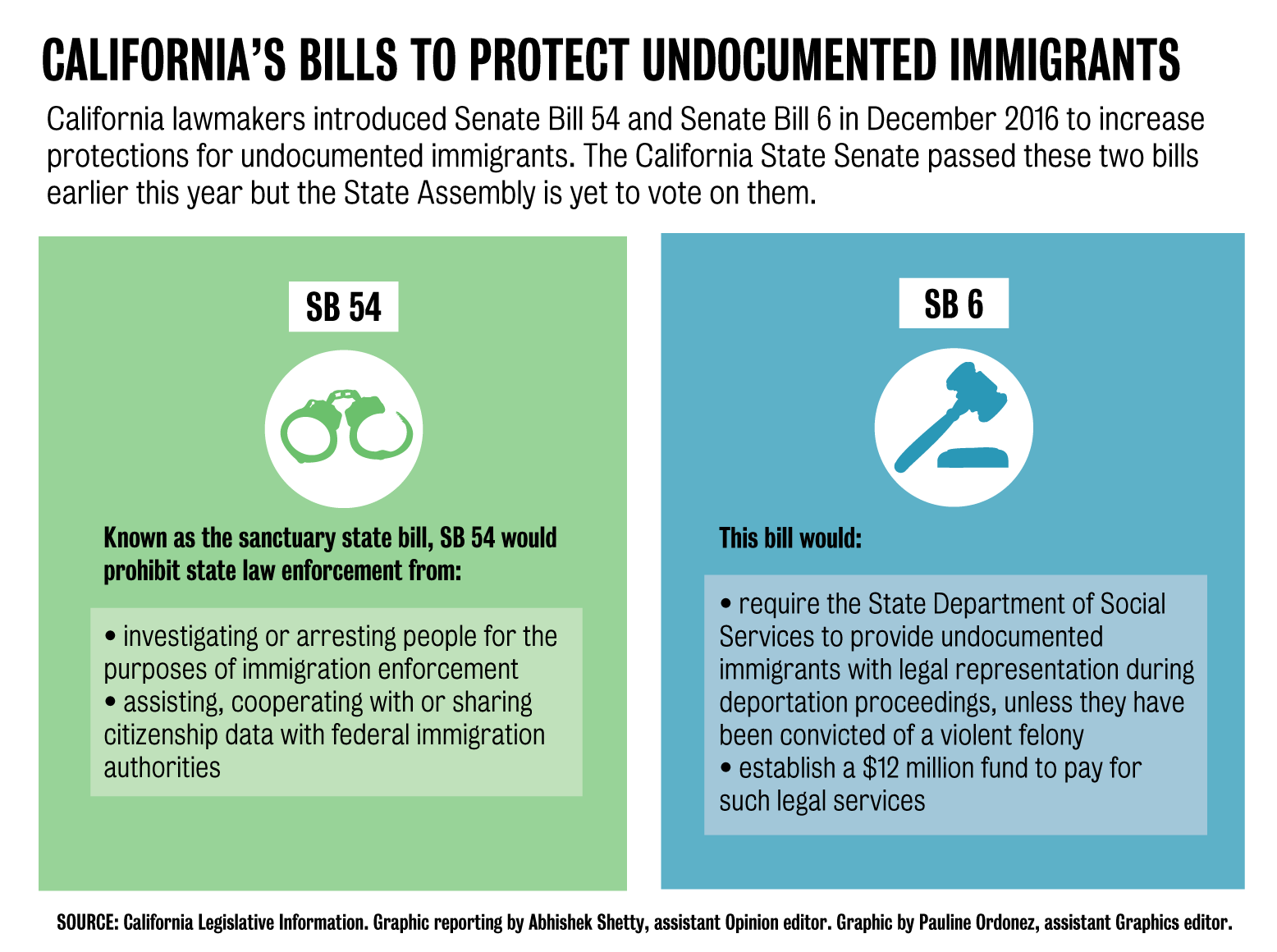Stuart Key: New Senate bills would help undocumented Californians if passed

By Stuart Key
Aug. 28, 2017 10:47 a.m.
Nearly 2.5 million undocumented Californians, including nearly 600 of our fellow Bruins, have found themselves in a precarious position this year: President Donald Trump may decide where they get to call home.
Last month, the Trump administration announced a new policy against sanctuary cities that would limit federal funding for local governments if they do not cooperate with federal agents when dealing with undocumented immigrants. Under the new policy, cities will be required to notify federal officials when undocumented individuals are to be released from custody. In addition, cities will be unable to block federal officials from obtaining information about a person’s immigration status.
California officials condemned the policy and introduced legislation that directly challenges it – specifically Senate Bills 6 and 54, which would, respectively, prohibit state and local agencies from utilizing their resources for enforcing immigration policies and create a $12 million defense fund for those facing deportation but have not committed violent felonies.
Passing these two bills is vital, as they establish California as a true sanctuary state and protect residents from federal anti-immigrant policies. Specifically, they will ensure wrongful detainment, discrimination and abuse against members of the undocumented community is not tolerated.
Many counties and cities have already declared themselves as sanctuaries for immigrants who do not have legal status by enacting policy that limits the amount of cooperation with Immigration and Customs Enforcement. However, they do not fully prohibit state agencies or local law enforcement from cooperating with ICE agents.
On the other hand, SB 54 and SB 6, if passed, would officially establish California as a sanctuary state.
In particular, SB 54 would prevent state and local police from investigating or detaining people for immigration enforcement purposes, as well as prevent the distribution of personal information regarding the legal status of individuals to ICE agents. The bill would also establish “safe zones” for immigrants without legal status by necessitating institutions like public schools and courthouses run by state or local governments enforce the same policies.
And if people without legal status are detained, SB 6 would ensure they are provided with legal representation for any immigration hearings or cases since they are not currently entitled to public defense resources. This change is vital for ensuring that defendants are provided with a fair trial.
Unfortunately, these bills aren’t without their opponents. State Republican legislators, for example, claim the laws could make policing harder and allow criminals to walk free. Gov. Jerry Brown, whose approval is necessary before either bill becomes law, said he is hesitant about making California the first official sanctuary state, but that he wants to be understanding of undocumented people – an ambiguous stance, to say the least.
However, establishing these policies is key to protecting undocumented individuals and encouraging them to trust in their local law enforcement. According to a 2013 study conducted by the University of Illinois, 44 percent of Latino people are less likely to contact police if they have been victims of crime because they fear that they will be questioned about their legal status.
SB 54 can alleviate this problem. Undocumented families and individuals would be encouraged to come forward and report any crimes against them. Patricia Gandara, a UCLA Graduate School of Education and Information Studies professor and co-director of the Civil Rights Project at UCLA, said the bill would increase the willingness of members of the undocumented community to cooperate with local police and not live in constant fear of detainment.
And it’s equally crucial for SB 6 to pass to fund attorneys for defendants in immigration cases. According to Gandara, having guidance navigating the legal process would make a significant difference in reducing deportations and the tragedy of ripping families apart.
Certainly, it might seem as though these bills put state law enforcement officials in a bind and decrease the efficacy of police departments in fighting crime. But while SB 54 would limit ICE’s ability to find undocumented people, it still allows the information of those who are arrested to be shared with ICE, and it requires immigration enforcement be notified before any violent felons without legal status are released.
SB 6 has a similar provision that bars violent felons from receiving the benefits of the fund it establishes. SB 6 and SB 54 would thus work to prevent deportation from being a punishment for petty crime, and would, contrary to what Brown contends, not allow criminals to roam free.
It is important that bills like SB 54 and SB 6 pass, as they are just a start for protecting Californians during Trump’s administration. Undocumented people are vital members of our community – not to mention essential contributors the economy – and lawmakers shouldn’t show cold feet in passing essential state protections.


